This year's Global Benefits Attitudes Survey highlights employees' increasing need for security.
About this Survey
Since 2013, WTW has surveyed employees globally to understand the employee voice on benefits, drivers of attraction and retention, and attitudes around wellbeing.
A total of 45,000 employees working for medium and large private sector organizations in 29 countries and territories participated in the sixth biennial Global Benefits Attitudes Survey, which was conducted globally from January to March 2024.
The survey is a crucial complement to our employer research, including the Wellbeing Diagnostic and Global Benefit Trends surveys, and our survey of insurers, Global Medical Trends. Together, this research provides a 360-degree perspective on employee benefits.
Did you know that employees are increasingly viewing their employee benefits as a reason to work for, and stay with, their employer?
And it's not surprising — despite some improvements, most employees still face short-term financial issues, are under-saving for retirement, and worrying about access and affordability of care. Employees want remote work, but those that seek this flexibility are less engaged and more likely to feel burned out.
Against this backdrop, employees' appreciation for their employer-sponsored benefits is growing. How can employers use this momentum to get their employees the support they need? The Global Benefits Attitudes Survey — together with WTW's employer research — gives employers a crucial insight into employee wants and needs, an important navigation aid in this time of change.
10 key findings from the Global Benefits Attitudes Survey
Employees are dealing with a number of challenges
01
Financial concerns loom large for employees after the cost-of-living crisis
- Three in 10 workers say they are worse off than a year ago and have financial issues negatively impacting their lives (Figure 1).
- In the U.S., nearly nine in 10 are worried about being able to pay for basic necessities.
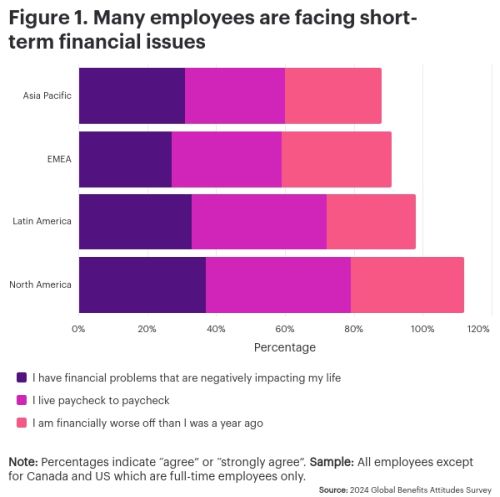
02
Retirement confidence has fallen
- Three in four employees report they are not saving enough for retirement, and roughly 50% are not on track for retirement (Figure 2).
- Employees expect to work longer — the share of employees expecting to work past the age of 70 has risen.
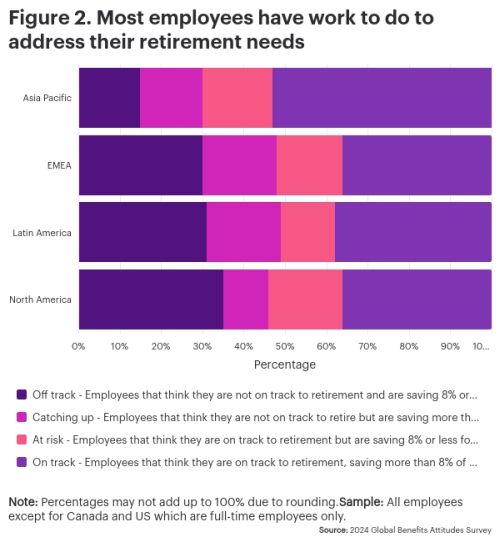
03
Mental health remains a challenge, despite some improvements post pandemic
- Since 2022, there have been improvements in emotional health, social wellbeing and burnout (especially for the youngest workers).
- But there are still issues surrounding mental health; around half of younger workers show signs of anxiety and depression.
04
Access to care is a key concern for employees
- Health systems have been put under pressure coming out of the pandemic — survey respondents said they are seeing lengthening waiting times.
- On average, four in 10 workers are worried about wait times in the future (Figure 3).
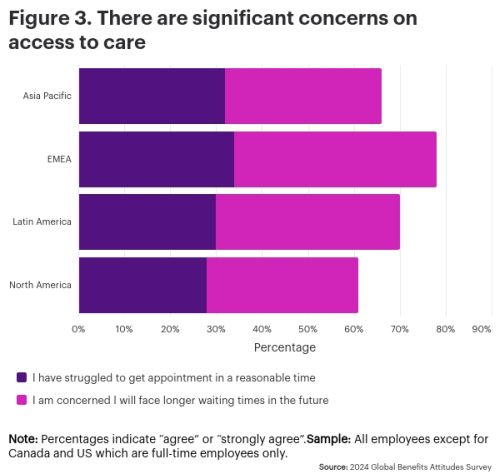
What do employees want and need?
05
Employees are looking for greater security
- While pay remains the top focus, employees are increasingly looking for greater security in the face of economic uncertainty.
- Benefits are as important as ever for attraction and retention: Since 2017, there's been a 50% increase in the importance of benefits as a reason to take a job (Figure 4).
Figure 4. The importance of benefits to employees has risen
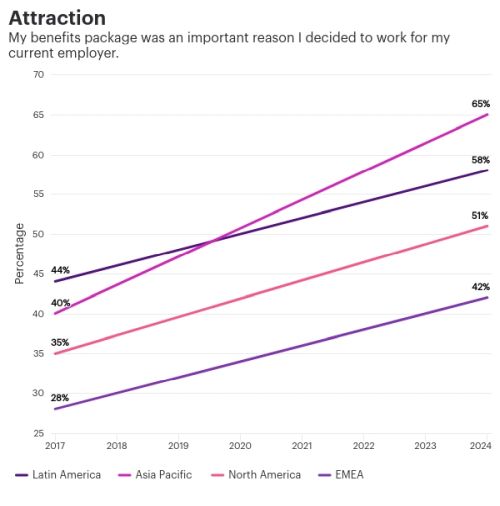 |
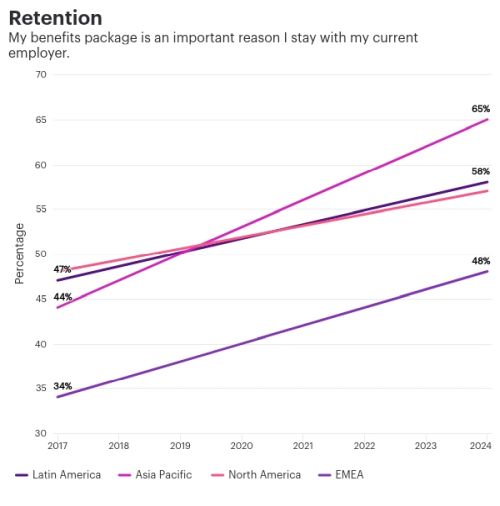 |
Note: Percentages indicate "agree" or "strongly agree".
Sample: All employees except for Canada and US which are full-time employees only.
Source: 2017 and 2024 Global Benefits Attitudes Survey
Complete the form on the right, or below on a mobile device, to view the rest of our key findings, and download the full report.
In this research, we aim to help employers better understand their workforce and strategically adapt their benefit practices and policies to stay ahead of the game, keep their employees happy, engaged and productive and successfully attract the right talent. We put the employees center stage and ask their views on their benefit and reward packages, their wellbeing and job flexibility, and their employers' policies and programs.
The content of this article is intended to provide a general guide to the subject matter. Specialist advice should be sought about your specific circumstances.


